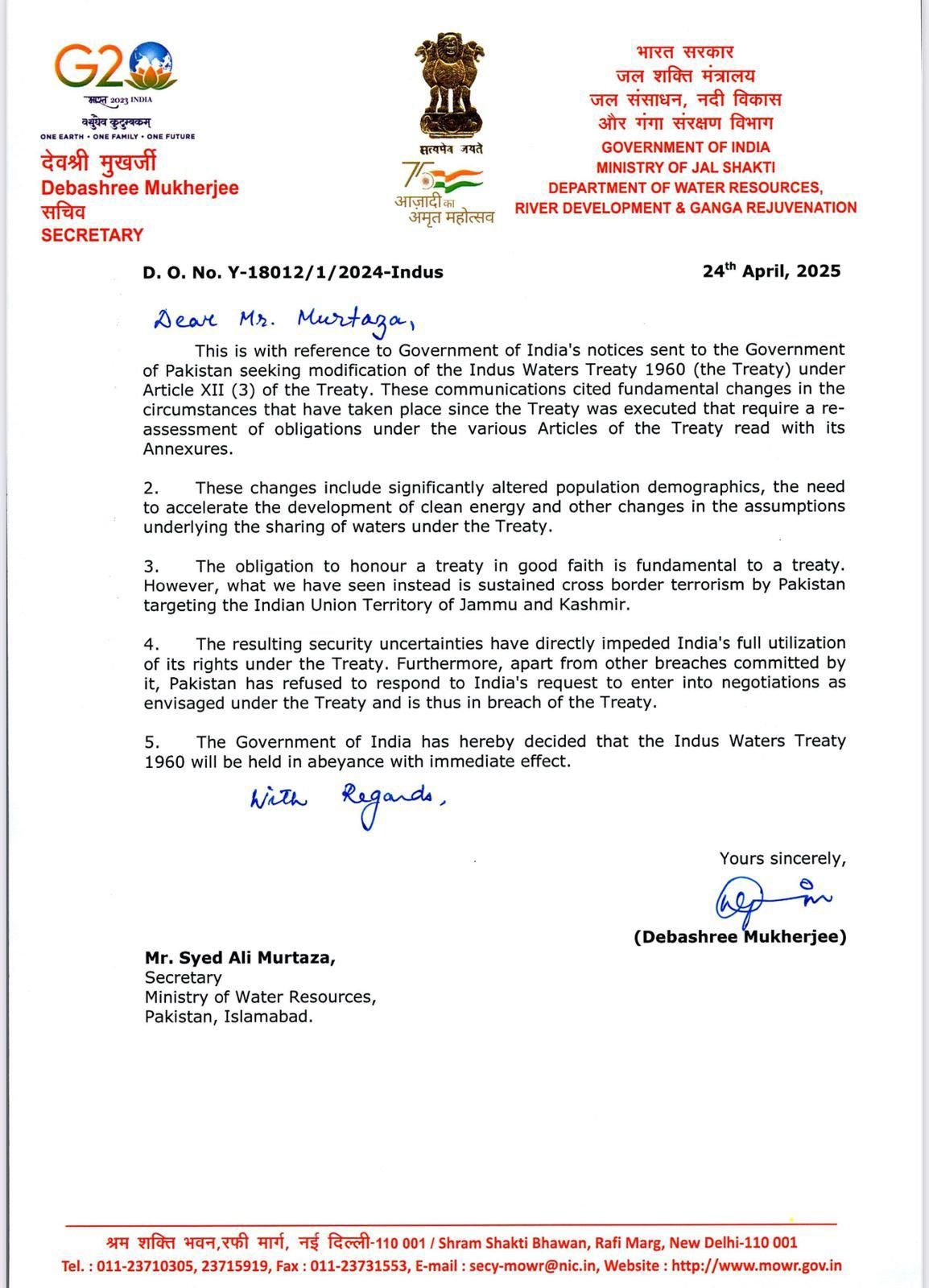By Suchitra Mukherjee
New Delhi [India], April 25 (ANI): Union Home Minister Amit Shah will hold a meeting regarding the Indus Water Treaty at his residence in the national capital on Friday (today) evening.
Besides the Home Minister and the Union Minister for Jal Shakti, CR Patil, other senior government officials, will attend this meeting.
Sources told ANI, “India has formally notified Pakistan in writing about the suspension of the Indus Water Treaty.”
Secretary of the Ministry of Jal Shakti, Devashree Mukherjee, has informed the Secretary of Pakistan’s Ministry of Water Resources, Syed Ali Murtaza, about this decision of the Indian government through a letter. India has issued a notice for changes in the treaty. The letter states that the Indian government has given notice to the Pakistani government for amendments to the treaty.
The notice mentioned that several fundamental aspects of the treaty have changed and require reconsideration. Changes in population, the development of clean energy, and various factors related to water distribution according to the treaty have occurred. Any treaty should be implemented in good faith, but Pakistan is promoting cross-border terrorism in Jammu and Kashmir.
The letter said India has sent notices to Pakistan government seeking modification of the Indus Waters Treaty 1960 (the Treaty) under Article XII (3) of the Treaty.
“These communications cited fundamental changes in the circumstances that have taken place since the Treaty was executed that require a re-assessment of obligations under the various Articles of the Treaty read with its Annexures,” the letter said.
“These changes include significantly altered population demographics, the need to accelerate the development of clean energy and other changes in the assumptions underlying the sharing of waters under the Treaty,” it added.
The letter said that obligation to honour a treaty in good faith is fundamental to a treaty.
“However, what we have seen instead is sustained cross border terrorism by Pakistan targeting the Indian Union Territory of Jammu and Kashmir. The resulting security uncertainties have directly impeded India’s full utilization of its rights under the Treaty,” it said.
“Furthermore, apart from other breaches committed by it, Pakistan has refused to respond to India’s request to enter into negotiations as envisaged under the Treaty and is thus in breach of the Treaty. The Government of India has hereby decided that the Indus Waters Treaty 1960 will be held in abeyance with immediate effect,” it added.
The Government of India has hereby decided that the Indus Waters Treaty 1960 will be held in abeyance with immediate effect.
Following the Centre’s announcement to suspend the Indus Water Treaty with Pakistan in response to the Pahalgam terror attack, Jal Shakti Minister CR Patil chaired a series of meetings yesterday to expedite the implementation of the decision, as directed by the Prime Minister.
The Indian government has taken a significant step following the cowardly terrorist attack in Pahalgam, Jammu and Kashmir.
The government has temporarily suspended the Indus Waters Treaty with Pakistan.
This decision was made at a meeting of the Cabinet Committee on Security (CCS) held on April 23, chaired by Prime Minister Narendra Modi, and attended by Home Minister Amit Shah, Defence Minister Rajnath Singh, and External Affairs Minister S. Jaishankar.
This comes after terrorists attacked tourists at Baisaran meadow in Pahalgam on April 22, killing 25 Indian nationals and one Nepali citizen while leaving several others injured.
The Indus Waters Treaty was signed in 1960, following nine years of negotiations between India and Pakistan, with the assistance of the World Bank, which is also a signatory. The negotiations were initiated by former World Bank President Eugene Black. Recognised as one of the most successful international treaties, it has endured frequent tensions, including conflict, and has provided a framework for irrigation and hydropower development for over half a century.
The Indus Waters Treaty governs the use and distribution of the waters of the six rivers of the Indus basin – Indus, Jhelum, Chenab, Ravi, Beas, and Sutlej – between India and Pakistan. Under this treaty, the western rivers (Indus, Jhelum, and Chenab) are allocated to Pakistan, while the eastern rivers (Ravi, Beas, and Sutlej) are allocated to India. (ANI)
Disclaimer: This story is auto-generated from a syndicated feed of ANI; only the image & headline may have been reworked by News Services Division of World News Network Inc Ltd and Palghar News and Pune News and World News
HINDI, MARATHI, GUJARATI, TAMIL, TELUGU, BENGALI, KANNADA, ORIYA, PUNJABI, URDU, MALAYALAM
For more details and packages














